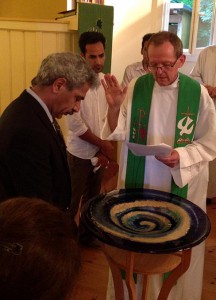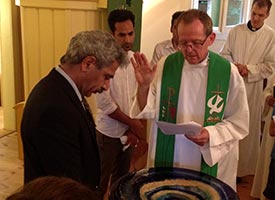By Elizabeth Ahlman
On Aug. 4, 2014, The Leipzig BILD Zeitung newspaper ran an article with the tag line “BILD Exclusive with Leipzig’s Most Dangerous Baptism: Here Muslims Became Christians.”
The article was referring to the baptisms of four former Muslims July 27 at St. Trinitatisgemeinde (Holy Trinity Lutheran Church), a congregation of the Selbständige Evangelische—Lutherische Kirche (SELK) in Leipzig, Germany. The SELK is an LCMS partner-church body.

On that Sunday, Rev. Hugo Gevers, SELK missionary to the migrant population of Leipzig, baptized a husband and wife along with two other men during the Divine Service. Using a baptismal rite in both German and Farsi, Gevers led the candidates through the rite. A special feature of this liturgy is a purposeful moment: during the time when the candidate denounces the devil and his works, these former Muslims also denounced their former faith.
“I renounce Islam and confess that neither is the Koran God’s revelation nor is Mohammed God’s prophet,” is the English translation of what they said.
It was a poignant moment, Gevers pointed out, because many of them had Christian ancestors who had to renounce their Christianity and confess Islam on fear of death centuries ago. Now, the Persian Christians who come to Leipzig and are baptized reverse that confession — not under fear of death, but out of faith and in joy.
This moment was also a turning point in their lives. They confessed the one true faith in the Apostle’s Creed, translated into Farsi. Then, Rev. Gevers spoke the baptismal formula and poured water on their heads. Now they are marked as children of God, sharers in Christ’s death and resurrection, and members of God’s family. They are also now marked for death.
Two of the men who were baptized agreed to speak for this story.
Eizadi Shahriyar is a 49-year-old asylum-seeker who now lives in Schkeuditz, outside Leipzig. He and his wife, along with their two children (10 and 14 years old) fled Iran about 11 months ago. It took them another month to escape to Germany. They were introduced to Christianity by an acquaintance while they still lived in Iran. It is for this reason they had to flee.
Once in Germany, a German Christian couple befriended the Shahriyars. Knowing that the family wished to become Christians, they asked Gevers at Die Bruecke in Leipzig for his help. They knew this “meeting house” sponsored by St. Trinitatisgemeinde offered Bible studies and Christian instruction with Farsi translation for migrants. For Eizadi Shahriyar, “It was very important to me that the teaching was translated into Farsi, and I could understand the biblical teachings very well.”
“This thing was very beautiful for me,” he said of his baptism. “To me it was as if I knocked on a door and it opened, and everything was wonderful. I had a family, a new family… . I have hope now; everything is different in my life. My look on the future is also very different now.”
Even with this hope for the future, there are still difficulties. Shahriyar’s wife is also baptized, but fears speaking out. Their two children are not yet baptized.
“I have the hope indeed that my children also will be Christians, and we have tried to have them baptized,” he said. “We speak to them about this.”
Gevers believes that fear of what might happen to the family if they are sent back to Iran may play a role in the fact that the children are not yet baptized.
Despite the legitimate and understandable fears of his family, Eizadi Shahriyar says, “It is to me, the peace that I have in faith, is most important. And therefore I do not think of the fear anymore.”
Unlike the Shahriyars, Jahu (whose last name is withheld for his protection) is not Iranian. He was living in Iran, but is actually from Afghanistan. Fifteen years ago, Jahu’s father was killed for political reasons, and had always encouraged his son to find freedom. He had also mentioned the 10 Commandments to his son.
Gevers says that according to Jahu, “his father always said to him, ‘You learn your 10 Commandments,’ which is very untypical of Muslims. They would learn other things, not the 10 Commandments … [Not] then, but later, he knew his father must have had some connection with Christians. So this part, to him, was very important.”
Based on his father’s encouragement, Jahu sought freedom, but the search changed when he met a Christian in Iran. The man prayed for him and a difficult problem. Soon after, the problem was resolved. Jahu says he wondered how this was possible.
Through the encounter with that man, Jahu joined a group of other young people who were learning about the Christian religion. He says, “I was not looking for any religion to get the freedom like I want … I was looking only for the freedom, the free life, in my mind. Absolutely, the things I want I found it in the Christian religion and the Bible.”
When he came to Leipzig some seven months ago, Jahu met Gevers and Vicar Thomas Beneke, an SELK mission vicar working with Gevers and Die Bruecke.
In addition to work at Die Bruecke, Gevers and Beneke lead services in both German and Farsi in asylum homes around Leipzig. Jahu was in one in Borna, where the two hold a service. He said he learned the answers to his many questions from them, adding that Gevers “was a really good person to help find the answers.”
Jahu spoke about how impossible Islam is to follow, no matter how hard one tries, with its concept that God is far off and unreachable.
“[But] here in the Christian religion,” he says, “I know it now, I can talk with God, like friendly, very close. He is not a God that is always angry. In the Islam religion, God is always angry. He is just waiting for you to make a mistake … . Always, we were scared. But here I know that God is close to me, He is very near, and we can talk like friends.”
Next steps
Once the Persians are baptized, they become members of St. Trinitatisgemeinde, a German congregation. The goal for both Rev. Gevers and St. Trinitatisgemeinde’s Pastor Markus Fischer is that the Persian members become fully integrated with the German members. So far, they say, this has gone quite well. About a third of the baptized members are Persian, and there is a translation of the sermon for them after each service.
One Persian member of the congregation is an elder who reads the Epistle lesson in Farsi during the Divine Service.
Fischer says of his Persian members, “I want to show them ‘you are my dear members like the Germans also.’ ”
The German and Persian members benefit mutually from one another, as well, according to Fischer, who notes that there is much his German members learn from those who are Persian.
“I am very grateful about the Iranians that they are willing to confess publicly their Christian faith,” said Fischer. “This is another step we have to do … [It] is a great challenge to me to invite my own people to Christ. So it is a big help to us that we have the Iranian people already in our congregation, and that they can move us a little bit more forward to be more open to the public.”
At the same time, both Fischer and Gevers deeply feel the responsibility they have to their Iranian members, because of the potential danger to them, now that they are baptized. Both say that they deal with this responsibility in part by helping their members prepare for court hearings for permanent residency, and by accompanying them at those hearings.
In the German system, conversion to Christianity is seen as a recommendation for citizenship, though such conversions are met with skepticism.
These faithful Iranians, along with their pastors, confess the historic Lutheran faith before likely atheistic judges and await their judgment. Through prayer, teaching and the Divine Service, their pastors uphold and strengthen them in the faith and fight for their right to live in their newfound freedom in Christ.
To watch a video about baptisms of Persians in Germany, click here.
For more stories about LCMS-related work in Leipzig and Germany, visit the Eurasia blog at http://eurasiablog.lcms.org, go through the “Countries” tab and choose “Germany.”
Deaconess Elizabeth Ahlman is communication specialist for Eurasia with the LCMS Office of International Mission and is based in Leipzig, Germany.
Posted Oct. 23, 2014
